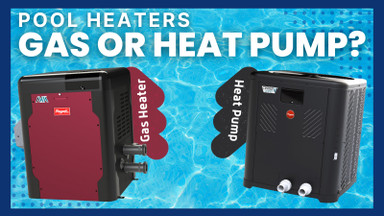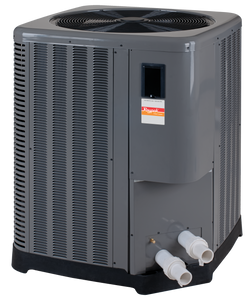Published by Anthony on 01/09/2025
Gas Pool Heater vs Heat Pump - What Should I Choose?
When it comes to heating your pool, choosing between a gas heater and a heat pump can be a challenging decision. Both options have their merits, and the best choice depends on various factors specific to your situation. Let's dive into the key considerations to help you make an informed decision.
Climate and Geography
The effectiveness of heat pumps and gas heaters can vary significantly based on your local climate:
- Warm Climates: Heat pumps are highly efficient in areas with mild to warm temperatures. They work best when the air temperature is above 50°F (10°C), making them ideal for regions with longer swimming seasons.
- Cold Climates: Gas heaters are more suitable for colder regions. Unlike heat pumps, gas heaters can operate efficiently regardless of the outside temperature, allowing for year-round swimming in any climate.
Energy Prices and Availability
The cost-effectiveness of your pool heater largely depends on local energy prices:
- Electricity Costs: In areas with low electricity rates, heat pumps can be more economical to operate long-term.
- Natural Gas Availability: If natural gas is readily available and affordable in your area, a gas heater might be more cost-effective.
- Propane Costs: In regions where propane is the primary gas option, consider the local propane prices when evaluating a gas heater.
Efficiency and Operating Costs
- Heat Pumps: Generally more energy-efficient, especially in warmer climates. They can be up to 80% more efficient than gas heaters over a long heating season.
- Gas Heaters: While less energy-efficient overall, they can be more cost-effective for short-term or occasional heating needs.
Heating Speed
- Gas Heaters: Ideal for quick temperature adjustments. They can heat a pool rapidly, making them perfect for occasional use or when you need to raise the temperature quickly.
- Heat Pumps: Heat more slowly but are efficient for maintaining a consistent temperature over time.
Environmental Considerations
- Heat Pumps: More environmentally friendly as they use electricity and transfer heat rather than generating it.
- Gas Heaters: Produce carbon dioxide emissions, making them less eco-friendly.
Raypak Recommendations
At EZ Pool & Spa Supply, we are a Raypak Preferred Partner and we highly recommend Raypak heaters for their reliability and efficiency:
- Raypak Gas Heaters: Available in both propane and natural gas options, these heaters are excellent for rapid heating and colder climates.
- Raypak Heat Pumps: Ideal for energy-efficient heating in moderate to warm climates.
Choosing the Right Heater for Your Scenario
- Year-round swimming in cold climates: Opt for a Raypak gas heater.
- Extended swimming season in warm climates: A Raypak heat pump is your best bet.
- Occasional heating or quick temperature adjustments: Consider a gas heater.
- Low electricity costs and mild climate: Heat pump is likely more cost-effective.
- Limited natural gas availability: Evaluate between a propane gas heater or a heat pump based on local energy prices.
- Natural gas availability: Consider using a natural gas pool heater.
- Environmentally conscious choice: Heat pump is the greener option.
- Combination of warm and cold seasons: Consider a dual-heater system with both gas and heat pump options for maximum flexibility.
In conclusion, the choice between a gas heater and a heat pump depends on your specific circumstances. Consider your local climate, energy prices, heating needs, and environmental concerns. Whether you choose a Raypak gas heater or heat pump, both offer quality solutions for your pool heating needs. Consult with our experts at EZ Pool & Spa Supply to find the perfect heater for your unique pool setup.





